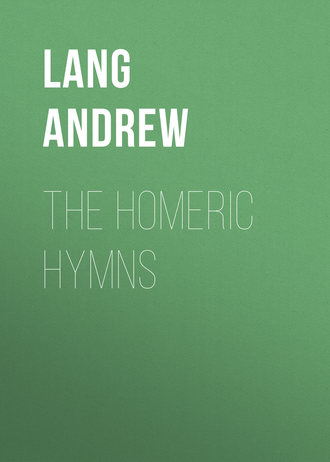 полная версия
полная версияThe Homeric Hymns
67
Such sandals are used to hide their tracks by Avengers of Blood among the tribes of Central Australia.
68
This piece of wood is that in which the other is twirled to make fire by friction.
69
Otherwise written and interpreted, “as even now the skins are there,” that is, are exhibited as relics.
70
“Der Zweite Halbvers is mir absolut unverstandlich!” —Gemoll.
71
This is not likely to be the sense, but sense the text gives none. Allen, Journal of Hellenic Studies, xvii. II.
72
“As if one walked with trees instead of feet.” —Allen.
73
The passage which follows (409-414) is too corrupt to admit of any but conjectural rendering. Probably Apollo twisted bands, which fell off Hermes, turned to growing willows, and made a bower over the kine. See Mr. Allen, op. cit.
74
This passage is a playing field of conjecture; some taking συμβολον = Mediator, or Go-between: some as = pactum, “covenant.”
75
There seems to be a reference to the caduceus of Hermes, which some have compared to the forked Divining Rod. The whole is corrupt and obscure. To myself it seems that, when he gave the lyre (463-495), Hermes was hinting at his wish to receive in exchange the gift of prophecy. If so, these passages are all disjointed, and 521, with what follows, should come after 495, where Hermes makes the gift of the lyre.
76
It appears from Philochorus that the prophetic lots were called thriæ. They are then personified, as the prophetic Sisters, the Thriæ. The white flour on their locks may be the grey hair of old age: we know, however, a practice of divining with grain among an early agricultural people, the Hurons.
77
Hestia, deity of the sacred hearth, is, in a sense, the Cinderella of the Gods, the youngest daughter, tending the holy fire. The legend of her being youngest yet eldest daughter of Cronos may have some reference to this position. “The hearth-place shall belong to the youngest son or daughter,” in Kent. See “Costumal of the Thirteenth Century,” with much learning on the subject, in Mr. Elton’s “Origins of English History,” especially p. 190.
78
Shielings are places of summer abode in pastoral regions.
79
Reading χεισεται, Mr. Edgar renders “no longer will my mouth ope to tell,” &c.
80
κλισμος seems to answer to fauteuil, διφρος to tabouret.
81
M. Lefébure suggests to me that this is a trace of Phœnician influence: compare Moloch’s sacrifices of children, and “passing through the fire.” Such rites, however, are frequent in Japan, Bulgaria, India, Polynesia, and so on. See “The Fire Walk” in my “Modern Mythology.”
82
An universally diffused belief declares that whosoever tastes the food of the dead may never return to earth.
83
The lines in brackets merely state the probable meaning of a dilapidated passage.
84
This appears to answer to the difficult passage about the bonds of Apollo falling from the limbs of Hermes (Hermes, 404, 405). Loosing spells were known to the Vikings, and the miracle occurs among those of Jesuits persecuted under Queen Elizabeth.
85
There is a gap in the text. Three deeds of Dionysus must have been narrated, then follows the comment of Zeus.









